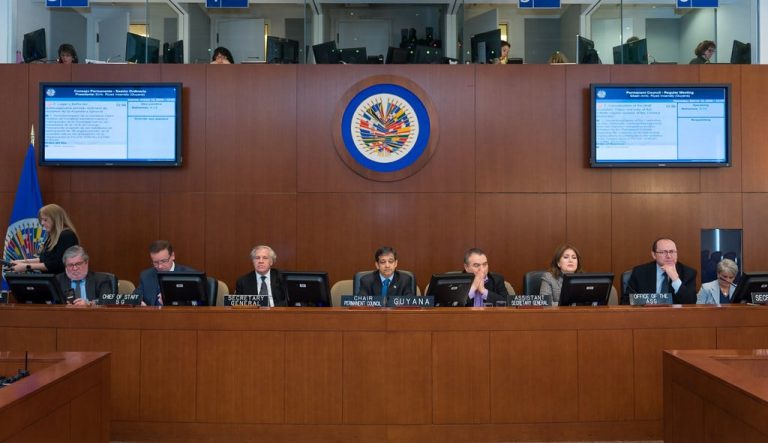19 de octubre 2020

Children of Exile: The Births “Sowing Hope” in the Camp of Nicaraguan Farmers

PUBLICIDAD 1M
PUBLICIDAD 4D
PUBLICIDAD 5D
Ortega only understands the correlation of forces. He’ll negotiate only when he finds himself up to his neck in water, inside or outside the OAS.

Ortega only understands the correlation of forces. He’ll negotiate only when he finds himself up to his neck in water
On October 20-21, the Organization of American States’ (OAS) holds their annual General Assembly in Washington DC. It’s natural that this event should awaken the interest of the majority of Nicaraguans. The OAS has been one of the organizations most concerned about Nicaragua, both during and before the April 2018 crisis.
However, their shared interest hasn’t led to any convergence of opinion. One sector has carried on an active campaign to have the Assembly declare the Ortega regime illegitimate. Meanwhile, some other members play down the declarations made by organs of the international community. There are also those who argue that separating Ortega from the OAS simply isn’t convenient. If they keep him in the organization, they reason, the possibilities of forcing him to negotiate are greater.
As a point of entry, it’s certainly difficult to get rid of governments through international declarations. However, it’s also certain that deepening the regime’s isolation is relevant to the struggle for democracy. In doing that, the pronouncements of international organizations are decisive and we can’t underestimate them. Each declaration is another step that adds up.
Eventually, they can generate the political conditions needed for more forceful decisions. The sanctions of the US government or of the European Council are a good example. These have more political force because they’re backed by the resolutions of international organizations like the OAS or the European Parliament.
But let’s return to the topic of the OAS General Assembly. Last year, in Colombia, this organ issued a statement regarding the situation in Nicaragua. It resolved to create a high-level commission charged with facilitating a negotiated solution to the crisis. This was accompanied by a warning. Based on the results of their proceedings, the Permanent Council could call for an Extraordinary session of the General Assembly. In such a case, the session would consider applying Article 21 of the Democratic Charter to Nicaragua. That is, suspending the regime’s membership in the OAS.
Ortega didn’t even allow the inter-American emissaries to enter the country. That, however, didn’t bring him any greater consequences, at least within the scope of the OAS.
It’s a question of “political arithmetic”. Approving a resolution suspending Ortega from the OAS requires 24 votes. Up until now, that threshold has remained out of reach. Every country has an equal vote. Brazil, with over 200 million inhabitants, has an equal vote with a small Caribbean island whose population barely reaches 500,000. Some of these Caribbean isles remain under the influence of Nicolas Maduro’s regime.
The first thing to consider, then, is if the 24 votes needed to remove Ortega from the OAS exist or not. Or, if there are enough votes to have him declared illegitimate.
Before continuing, let’s consider the position of those who feel that separating Ortega from the OAS isn’t convenient.
In my understanding, these are very weak arguments, from the political as well as the legal angle.
Politically, the possibility of Ortega’s committing to serious negotiations doesn’t depend on whether he’s within or outside of the OAS. The reality is, up until today, from inside the organization, he couldn’t care less about the commitments he’s subscribed. He’s completely ignored the accords he signed with Almagro, regarding electoral reforms, the Democratic Charter obligations or the OAS resolutions.
Anyone failing to understand this, has simply chosen not to understand. The only language our authoritarian ruler understands is the language of correlation of forces. He knows no other. He’ll negotiate only when he finds himself up to his neck in water. This is so, whether he’s inside or outside of the OAS.
Contrary to the beliefs of those who trust Ortega’s negotiating spirit, removing him from the organization will deepen the pressure. It will also increase his international isolation.
As far as legal arguments are concerned, we have Article 21 of the Democratic Charter. According to this, governments that have been removed from the organization for breaking the constitutional order still have obligations. They are still required to fulfill their international commitments.
In conclusion, there aren’t 24 votes for this. What alternative is left? Many will probably be unsatisfied, but lead-ups suggest that the organization may take only a small step forward. It could adopt a resolution reintroducing the process of applying the Democratic Charter to Nicaragua. This would be accompanied by a declaration indicating that Daniel Ortega’s government has altered the constitutional order. The latter is established in articles 3 and 20 of the Democratic Charter. As a consequence, the OAS Assembly could resolve to follow the route specified in said Charter.
In any case, whatever resolution they adopt, it should include the following demands for Nicaragua:
It would also be fitting to urge all the OAS Member States and Permanent Observers to adopt their own measures. These should be in conformity with international law and their own national legislation. However, nations should be encouraged to consider appropriate diplomatic, political, economic and financial measures in regards to Nicaragua. These could contribute to the rapid restoration of the democratic order in the country.
Finally, there’s something we can’t forget. The reality is that in these environments, the ones resolving are the governments and their representatives. And governments are guided first of all by their interests and political affinities. The rigors of ethics are reserved for other spaces.
Archivado como:
PUBLICIDAD 3M
Economista y abogado nicaragüense. Aficionado a la historia. Bloguero y conductor de la plataforma de comunicación #VamosAlPunto
PUBLICIDAD 3D